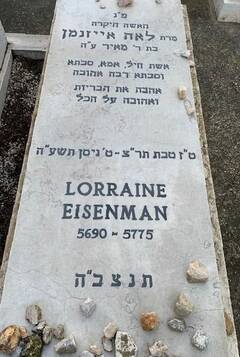Leah bas Meir A"H
04/03/2023 02:59:03 PM
Rabbi Eisenman
| Author | |
| Date Added | |
| Automatically create summary | |
| Summary |

My mother, Lorraine Eisenman (January 16, 1930, 16th of Teves 5690- March 29, 2015- Nissan 9, 5775), was born in the South Bronx in the Hunts Point section.
Her parents soon moved to Crown Heights, Brooklyn.
After marriage to my father, she would remain there until I was six when we moved to Canarsie, where they remained until the mid-1980s.
My parents spent their last years in Fort Lee, NJ, to be closer to their two sons, who lived in Teaneck and Passaic.
Today is her eighth Yahrtzeit.
If I look back at the 55 and a half years I was privileged to know her, there is one trait that stands out more than any other.
There is one Middah Tova (good trait) in which she excelled to the highest degree; this was “Maavir Al Midosea.”
This translates in English as someone who excels in “conflict avoidance.”
However, the Hebrew phrase translates more literally as a person “who forfeits or
“passes over” those things which one naturally others would want make a conflict about.”
Allow me to elaborate.
Often in life, some things make us feel as if we have been slighted.
And sometimes we are.
And sometimes, we have to stand up for ourselves.
However, very often, in the broad picture of life, these “slights” are unimportant and can serve as a catalyst to distract us from our ultimate goal.
In such cases, where the slight is meaningless and involves only our perceived “Kavod” being hurt, our sages, Chazal, advocated for us to “pass” and let the slight pass.
This is beautifully illustrated in the anecdote related in the Gemara in Taanis
25b.
The Gemara informs us that during a drought, two great Rabbinic giants approached the Amud as a Chazzan to daven for rain.
Rebbi Eliezer went first and was not answered.
Then Rebbe Akiva approached the Amud and was answered, and rain fell.
The Gemara comments that a Heavenly voice declared, “Do not think that Rebbi Akiva is greater than Rebbe Eliezer. Rather, Rebbe Akiva excels in the Midah (trait) of being “Ma’avir Al Midosov.”
Namely, Rebbe Akiva is more forgiving and allows slights to pass.
And for this reason, he was answered, and the rain fell.
The reasoning is obvious and compelling.
Hashem is the greatest “Ma’avir Al Midosov”- He constantly ignores our slights to Him. Yet, he continues to provide us with sustenance and kindness.
Obviously, he or she who also excels in this Middah will have their Tefillos answered.
My mother excelled in this Middah of allowing things to pass.
She was the paradigm of Shalom Bayis, never allowing real or perceived slights to deter or detract her from her ultimate goal, which was preserving Shalom in the family.
And ultimately, her allowing slights to pass proved correct.
Just as Rebbe Akiva’s Tefillos were answered, her Tefillos were responded to as she was beloved by the entire family, which was her most fervent Tefillah and desire.
One example of her being Maavir Al Midoseiah occurred when I was very young, and it left an indelible impression on my Neshama.
We were scheduled to attend a family function.
I could not have been more than six or seven, and my brother was a year older.
Her older sister, who had a car, arrived at the appointed time to pick us up.
My mother struggled with getting two small children ready for travel and was not ready when the car arrived.
Although time was not of the essence, her older sister, peeved at having to wait for her younger sister and her children, left us and proceeded on to the event in a huff.
My mother was hurt by her older sister’s leaving her in the lurch.
Nevertheless, she said (and I can still hear her words sixty years later), “I can’t believe my sister left me with two children and no mode of transportation. Yet, I cannot let her actions ruin the family Simcha.”
She realized that her mother, our grandmother, would be hurt if we did not attend.
Without hesitation, she schlepped my brother and me to the Eastern Parkway.
She hailed a cab, a luxury she never allowed herself.
Despite being hurt, she realized that if she let this personal slight cause her to “stand by her principles,” the only person she would be hurting was her mother.
She pushed herself past her personal hurt, and off we went to the family Simcha.
She never brought the subject up again. Not with her mother and not with her sister.
Only when I became a Rav and saw the pettiness of so many people in allowing perceived slights to ruin family Simchas did I realize the greatness of her actions.
By the end of her life, she personified what Shlomo HaMelch writes in Mishlei: “Many women have done well. However, you have ascended above them all.” (Mishlei 31:29)
May her Memory be for a Brocha.

Mon, October 13 2025
21 Tishrei 5786
Today's Calendar
| Hoshana Rabah |
| Columbus Day Indigenous Peoples' Day |
| Candle Lighting : 6:01pm |
| Parsha - Rabbi Eisenman : 8:30pm |
| Daf Yomi - Rabbi Jacobowitz : 9:00pm |
| Daf Hashavua Chaburah - Rabbi Yehudah Kovacs : 9:15pm |
Friday Night
| Candle Lighting : 5:54pm |
Shabbos Day
| Hilchos Shabbos - Rabbi Eisenman : 8:15am |
| Bein Adam L'Chaveiro - Rabbi Eisenman : 11:15am |
| Daf Yomi - Rabbi Jacobowitz : 2:40pm |
| Massechta Taanis - Rabbi Eisenman : 4:35pm |
| Sixth Perek of Brachos - Rabbi Wiederblank : 4:35pm |
| Mesillas Yesharim w. Shalosh Seudos - Rabbi Eisenman : 6:22pm |
This week's Torah portion is Parshas Bereshis
| Shabbos, Oct 18 |
Candle Lighting
| Monday, Oct 13, 6:01pm |
Hoshana Rabah
| Monday, Oct 13 |
Important Links
Zmanim
| Alos Hashachar | 5:44am |
| Earliest Tallis | 6:11am |
| Netz (Sunrise) | 7:05am |
| Latest Shema | 9:53am |
| Zman Tefillah | 10:50am |
| Chatzos (Midday) | 12:42pm |
| Mincha Gedola | 1:11pm |
| Mincha Ketana | 3:59pm |
| Plag HaMincha | 5:09pm |
| Candle Lighting | 6:01pm |
| Shkiah (Sunset) | 6:20pm |
| Tzais Hakochavim | 7:00pm |
| More >> | |
Privacy Settings | Privacy Policy | Member Terms
©2025 All rights reserved. Find out more about ShulCloud


